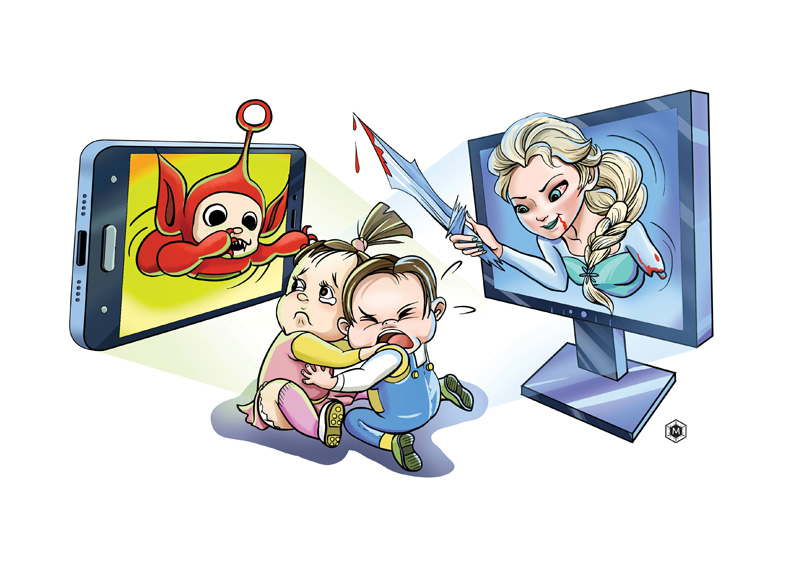Specific regulation needed for kids’ online safety


Editor’s note: Millions of Chinese children were exposed to thousands of cartoon videos with disturbing scenes of violence and sex that passed through the online “children filter”, leaving parents horrified and sparking a debate on cybersecurity for kids. Three experts share their views on the issue with China Daily’s Yao Yuxin. Excerpts follow:
Blocking disturbing videos easier than deleting them
Children are accessing the internet at a much younger age than, say, a decade ago. They are also spending more time online. As excessive online exposure can cause physical and/or psychological problems among children, even making them prone to violence, younger kids need special protection against the online violent videos.
With some famous look-alike cartoon characters and false claims of helping children learn about colors and characters, these disturbing videos use computer algorithms to lead the viewers toward violent, disturbing scenes. Since prevention is always better, an easier, than cure, the authorities should introduce foolproof firewalls to prevent such videos from entering the online network, and keep an eye on the suspicious products.
Innovative technology — through the dynamic use of algorithm — can play a key role in guaranteeing cybersecurity for children.
The authorities should also strengthen regulation, and improve legislation and implementation. Parents, on their part, should fulfill their responsibility toward their children, and educate them about the dangers of the internet, instead of handing their smartphones or tablets to their young children just to keep them “engaged”.
Zeng Xiangmin, a professor of Television and Journalism at the Communication University of China
Concerted efforts needed to fight potential threats
That violent videos are harmful for kids is not news. Too much exposure to videos and TV programs can turn kids into “couch potatoes” even if they don’t contain violence and sex. Plus, children are prone to imitating the actions of the characters in the videos, because they cannot differentiate between reality and fantasy. For example, two boys, aged 4 and 7, were found tied to a tree by their 10-year-old playmate in Jiangsu province in 2013 and both had suffered severe burns trying to imitate the actions of a “wolf grilling a goat” in the popular Chinese animation Pleasant Goat and Big Wolf.
So one can imagine what effect the videos that can lure kids into forbidden territories online will have on their mind.
Perhaps the rating system can, to a certain extent, prevent children from accessing “adult” contents. The “Elsagate” scandal (Elsa being the main character in the film Frozen) highlighted the dangers that kids exposed to online face. Elsagate refers to the controversy over supposedly child-friendly videos on YouTube and YouTube Kids that in reality contained themes inappropriate for kids. But the scandal also showed that specific regulations are needed to protect children from the hidden dangers on the internet.
So parents should carefully select the TV programs, videos and cartoon films that their children can watch, aside from teaching them to tell the right from wrong.
Liu Xiuying, director of Family Education Research Center at China Youth and Children Research Center
People violating cyber rules must be punished
There is no specific law that accords cyber-protection to kids. Thousands of videos that look like official versions of popular animations but have hidden contents not suitable for children’s viewing had been drawing plenty of viewers until they were deleted after the recent controversy.
Some evil-minded people made and uploaded countless clips, including violent parodies of popular Disney animation movie Frozen with the main character Elsa, which firstly is a violation of Disney’s copyright.
The importance of enacting a specific law on cybersecurity for children can never be exaggerated. To eliminate the new forms of violence against kids, video platforms should shoulder their social responsibility of removing videos with contents inappropriate for kids’ viewing from online sites meant for children.
Furthermore, a legal provision should be created to allow people other than parents and children to file public litigation to protect children against violent online videos and ensure children’s safety in cyberspace.
Du Jiangyong, a professor in the Civil and Commercial Law School at Southwest University of Political Science and Law
































